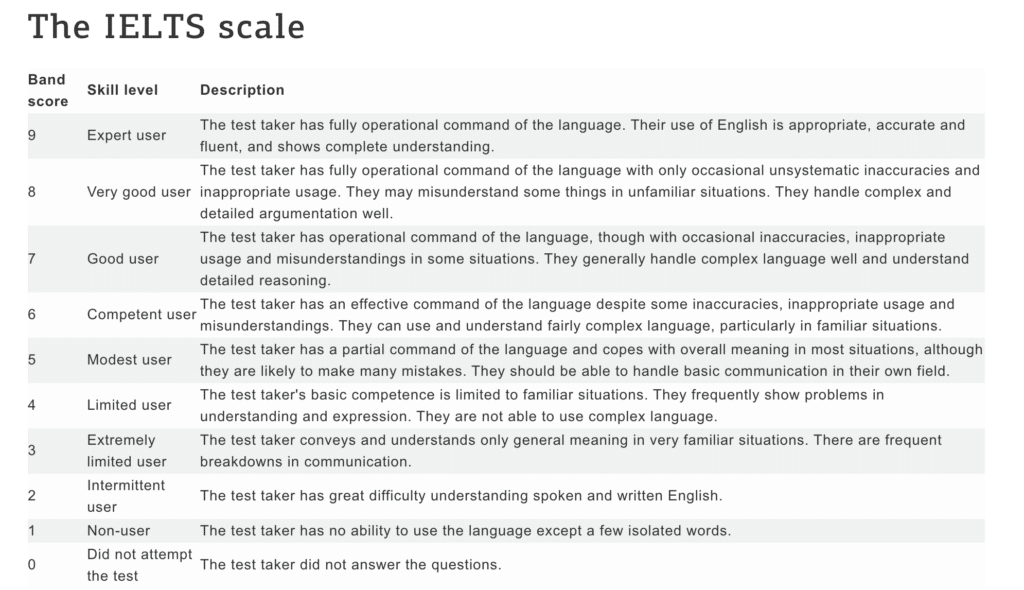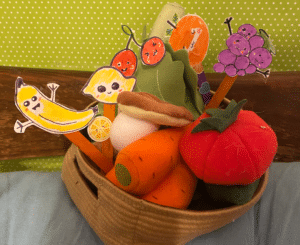When it comes to the IELTS, shoot for the moon. This means if you need a 6.5 score, then prepare to get a 7 when you study for the IELTS. If you know you need to speak for one to two minutes, always practice speaking for more than two minutes.
Here are the most important things to focus on when studying for the IELTS exam:
- Familiarize yourself with the test format: The IELTS exam has four sections – listening, reading, writing, and speaking. Make sure you understand the format of each section, including the types of questions and how much time you have for each section.
- Take practice tests: The best way to prepare for the IELTS exam is to take practice tests. This will give you a good idea of the types of questions you can expect on the exam and help you get used to the format and timing. Try to take as many practice tests as possible.
- Improve your reading skills: Reading is an important part of the IELTS exam. To improve your reading skills, try reading articles from English newspapers or websites. Pay attention to the vocabulary, sentence structure, and the author’s main point.
- Improve your listening skills: To improve your listening skills, listen to English podcasts or watch English movies or TV shows. This will help you get used to different accents and improve your comprehension.
- Improve your writing skills: Practice writing essays on a variety of topics. Use academic vocabulary and try to organize your ideas in a clear and logical way. Ask a teacher or tutor to give you feedback on your writing.
- Improve your speaking skills: Practice speaking English with a native speaker or a teacher. Sign up for a Cambly tutor, as this is the cheapest online tutor you can get. Give them prompts from IELTS Liz’s website and ask the mtoo pretend they are your IELTS prompter. Try to speak fluently and use academic vocabulary. Pay attention to your pronunciation and intonation.
- Learn academic vocabulary: The IELTS exam tests your ability to use academic vocabulary. I suggest reading The New Yorker and writing down every word you don’t know. Make this a habit. Try to use each new word in your week 3 times. This will ensure the vocabulary becomes deeply embedded in your mind. You can read the articles out loud and then you are practicing speaking asa well as expanding your vocabulary.
- Manage your time: Make a study schedule and stick to it. Allocate enough time for each section of the exam and try to simulate test conditions as much as possible.
- Take care of your health: Make sure you get enough sleep, exercise regularly, and eat a healthy diet. Taking care of your physical health can help you concentrate better and perform well on the exam.
- Get feedback: Ask a teacher or tutor to give you feedback on your practice tests and writing assignments. This will help you identify your strengths and weaknesses and improve your performance on the exam.
IELST Speaking Practice

The best website, in my opinion, to use for the IELTS is IELTS Liz. Liz’s site has lots of practice questions, and also great tips and strategies on how to ace your test.
IELTS Speaking Time
Be sure to talk for 1 to 2 minutes. The best way to do this is to shoot for over 2 minutes. You cannot talk too much! Dig down deep and find your inner chatterbox. When you study for the IELTS, use the following four tips to extend your IELTS speaking test.
Tips to keep talking:
- Dodge and Slide like a politician
- Address the Inverse
- Ponder the Implication
- WWWWH
Dodge and Slide like a politician
If you receive a prompt that intimidates you, such as a prompt about technology, architecture, or some field you worry you know nothing about…don’t panic. Address the question asked. Explain, honestly, that you don’t know much about the field of technology/architecture/brain surgery and say that you remember something related, however–then try to think of an anecdote from your childhood.
For example,
IELTS Prompt: “Tell me about a famous architectural site from your country.”
Dodge and Slide Response:
“I don’t know much about architecture so it is difficult for me to talk about a famous architectural site in my city; but, I do know about buildings in general. Let me tell you about an architectural site I can describe perfectly: my childhood home!
Address the Inverse
Addressing the inverse of a question is a great way to answer a question that you feel completely stumped on. For example, if they ask about your favorite piece of art, you could talk about a statue/painting/song you really hate. Just make sure to first address the question and explain why you will answer its inverse. Make sure the prompter knows that you understood the original prompt. This is a great extension technique, too.
Ponder the Implication
- Ask yourself, “So what?” or “Why should anybody care?” To keep discussing a topic, you can also try to consider what would happen if this issue or problem occurred in a different culture or during a different time period.
WWWWH
Try to ask yourself WWWWH if you need to extend your speaking time. Be sure you discussed: Who, What, Where, When, Why and How
IELTS Scoring

IELTS scores are reported on a scale of 9, with 1 being the lowest score and 9 being the highest. Most students need to attain a 7.5. This is the minimum score required for many programs. If so, shoot for an 8! If you need a 6.5, then shoot for a 7.

To keep practicing and to study for the IELTS further, I suggest the following:
- Audiobooks. Be sure to listen and read along with the captions. There are some great free youtube channels, like Learn English Through Stories, with books you can read and speak along to.
- Listen to music. Listen to music with lots of English lyrics as you fall asleep. Examples include Elvis Presley, Frank Sinatra, Leonard Cohen, Beyonce, The Beatles, The Kinks, Johnny Cash, Rihanna, Taylor Swift, Fiona Apple, Lisa Loeb, and so on.
- Talk to people online. Consider signing up online video gaming or Discords or Reddit groups that interest you. This way, you can practice writing and chatting in English in a casual, reoccuring setting. Also, for more structured practice, sign up for Cambly for some speaking practice. It is the cheapest way to practice conversational English.
- Read out loud. The Project Gutenberg texts are free and you can read them out loud to improve your grammar.
If you are interested in this, you might be interested in these posts, too.










